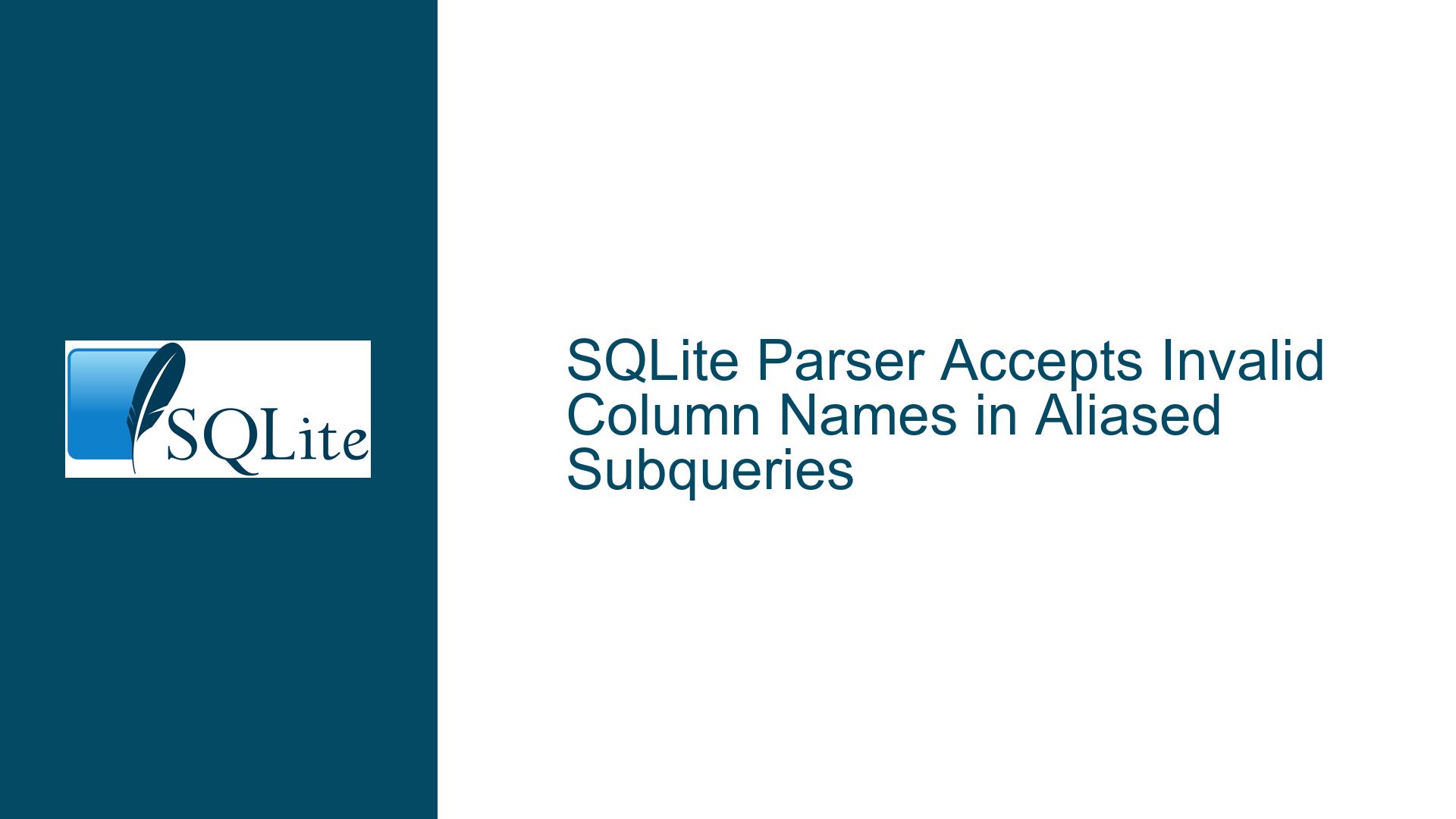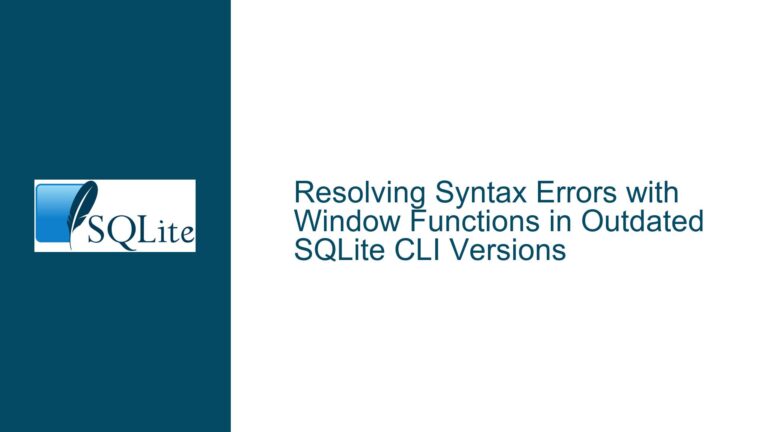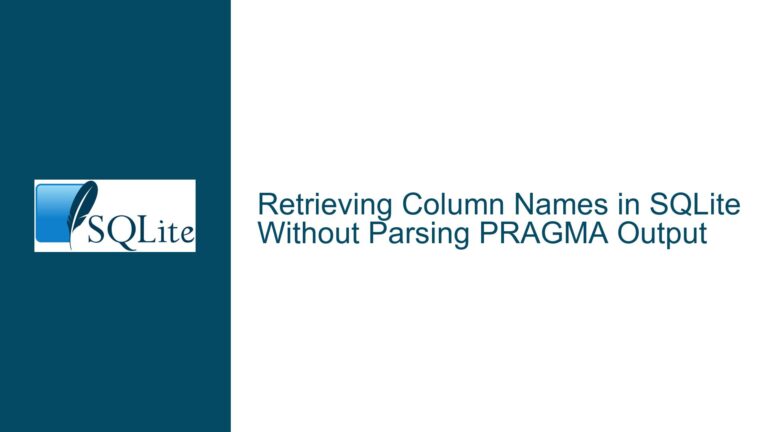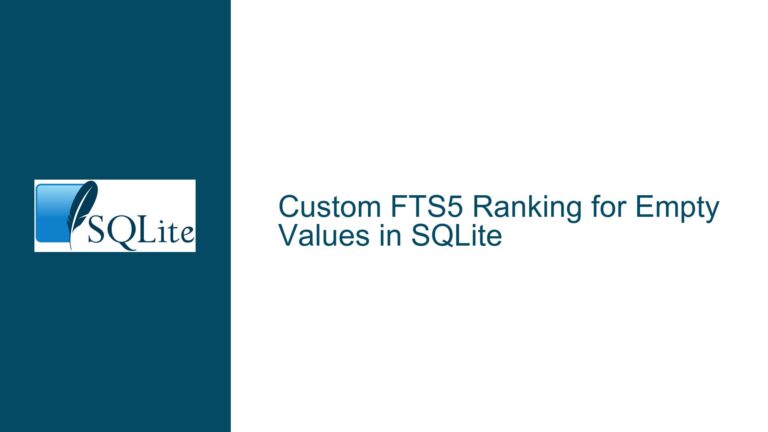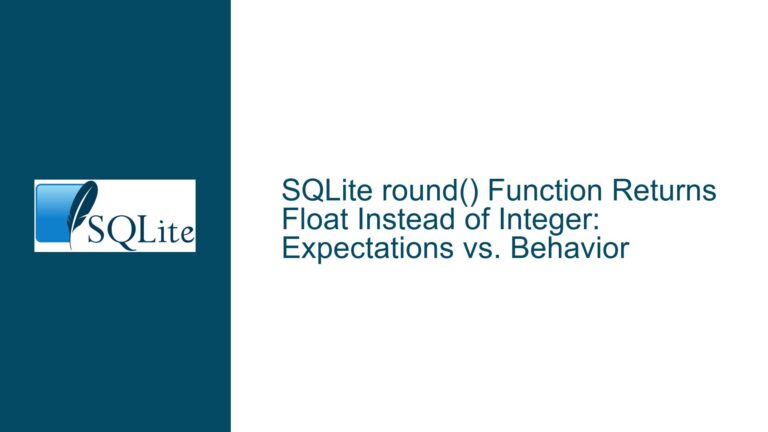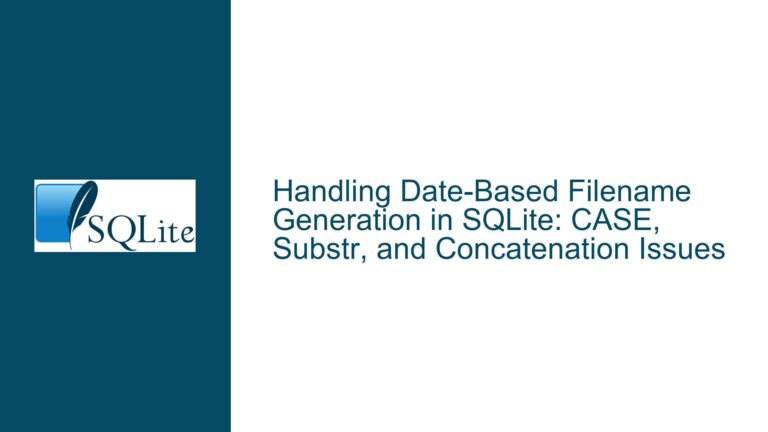SQLite Parser Accepts Invalid Column Names in Aliased Subqueries
Issue Overview: SQLite Parser Ignores Schema Prefix in Aliased Subquery Column References
In SQLite, the parser exhibits a behavior where it accepts arbitrary and non-existent schema prefixes in column references when accessing aliased subqueries. This behavior occurs when a query involves multiple subqueries with aliases, and the column references include a schema prefix that does not correspond to any valid schema. For example, in the query:
SELECT *
FROM (SELECT 42 AS val1) AS tbl1,
(SELECT 42 AS val2) AS tbl2
WHERE any_name_is_allowed_here.tbl2.val2 = any_name_is_allowed_here_too.tbl1.val1;
The parser accepts any_name_is_allowed_here.tbl2.val2 and any_name_is_allowed_here_too.tbl1.val1 as valid column references, even though any_name_is_allowed_here and any_name_is_allowed_here_too are not valid schema names. This behavior is inconsistent with the expected SQLite behavior, where schema prefixes should be validated against existing schemas.
The issue was identified in SQLite versions 3.22 and 3.34, and it was reported that the parser ignores the schema prefix when the table alias is valid. This means that the schema prefix is effectively disregarded, and the query proceeds as if the schema prefix were not present. This can lead to confusion and potential errors in query execution, as it allows for invalid schema references to be included in the query without raising an error.
Possible Causes: Schema Prefix Validation Bypass in Aliased Subquery Context
The root cause of this issue lies in the SQLite parser’s handling of schema prefixes in the context of aliased subqueries. When a query involves multiple subqueries with aliases, the parser’s validation logic for schema prefixes appears to be bypassed. Specifically, the parser does not validate the schema prefix against the list of existing schemas when the table alias is valid. This results in the schema prefix being ignored, and the query being executed as if the schema prefix were not present.
One possible explanation for this behavior is that the parser’s validation logic for schema prefixes is not fully integrated with the handling of aliased subqueries. In a typical query, the schema prefix is validated against the list of existing schemas before the query is executed. However, in the context of aliased subqueries, this validation step may be skipped or not fully enforced, leading to the acceptance of invalid schema prefixes.
Another possible cause is that the parser’s handling of schema prefixes in aliased subqueries is influenced by the way SQLite resolves table and column references. In SQLite, table and column references are resolved in a specific order, starting with the most specific reference and moving to the least specific. When a schema prefix is included in a column reference, the parser may prioritize the table alias over the schema prefix, leading to the schema prefix being ignored.
Additionally, the issue may be related to the way SQLite handles the parsing of complex queries involving multiple subqueries and aliases. In such queries, the parser may prioritize the resolution of table and column references over the validation of schema prefixes, leading to the acceptance of invalid schema prefixes.
Troubleshooting Steps, Solutions & Fixes: Addressing Schema Prefix Validation in Aliased Subqueries
To address the issue of the SQLite parser accepting invalid schema prefixes in aliased subqueries, several steps can be taken to ensure that schema prefixes are properly validated and that the query behaves as expected.
1. Validate Schema Prefixes in Aliased Subqueries:
The first step in addressing this issue is to ensure that schema prefixes are properly validated in the context of aliased subqueries. This can be achieved by modifying the SQLite parser to enforce schema prefix validation when resolving column references in aliased subqueries. Specifically, the parser should check the schema prefix against the list of existing schemas before proceeding with the query execution.
To implement this, the parser’s logic for resolving column references should be updated to include a validation step for schema prefixes. This validation step should be performed before the table alias is resolved, ensuring that the schema prefix is validated against the list of existing schemas. If the schema prefix is invalid, the parser should raise an error and prevent the query from executing.
2. Update Query Resolution Logic:
Another approach to addressing this issue is to update the query resolution logic to prioritize the validation of schema prefixes over the resolution of table aliases. In the current implementation, the parser may prioritize the resolution of table aliases over the validation of schema prefixes, leading to the acceptance of invalid schema prefixes.
To address this, the query resolution logic should be updated to prioritize the validation of schema prefixes before resolving table aliases. This can be achieved by modifying the parser’s logic to first validate the schema prefix against the list of existing schemas, and then proceed with the resolution of table aliases. This ensures that the schema prefix is validated before the query proceeds, preventing the acceptance of invalid schema prefixes.
3. Implement Schema Prefix Validation in the Parser:
In addition to updating the query resolution logic, the SQLite parser should be updated to include a dedicated validation step for schema prefixes in the context of aliased subqueries. This validation step should be integrated into the parser’s logic for resolving column references, ensuring that schema prefixes are validated before the query is executed.
To implement this, the parser’s logic for resolving column references should be updated to include a validation step for schema prefixes. This validation step should be performed before the table alias is resolved, ensuring that the schema prefix is validated against the list of existing schemas. If the schema prefix is invalid, the parser should raise an error and prevent the query from executing.
4. Test and Validate the Fixes:
Once the fixes have been implemented, it is important to thoroughly test and validate the changes to ensure that the issue has been resolved. This can be achieved by creating a series of test cases that involve aliased subqueries with invalid schema prefixes, and verifying that the parser correctly raises an error and prevents the query from executing.
The test cases should cover a range of scenarios, including queries with multiple subqueries and aliases, queries with nested subqueries, and queries with complex column references. The test cases should also include queries with valid schema prefixes, to ensure that the fixes do not introduce any regressions or unintended side effects.
5. Update Documentation and Provide Guidance:
Finally, it is important to update the SQLite documentation to reflect the changes and provide guidance on how to properly use schema prefixes in aliased subqueries. The documentation should include examples of valid and invalid schema prefixes, and explain the importance of validating schema prefixes in the context of aliased subqueries.
Additionally, the documentation should provide guidance on how to troubleshoot and resolve issues related to schema prefixes in aliased subqueries. This includes information on how to identify and fix queries with invalid schema prefixes, and how to ensure that schema prefixes are properly validated in the context of aliased subqueries.
Conclusion:
The issue of the SQLite parser accepting invalid schema prefixes in aliased subqueries can be addressed by updating the parser’s logic to enforce schema prefix validation, updating the query resolution logic to prioritize schema prefix validation, and implementing a dedicated validation step for schema prefixes in the parser. By thoroughly testing and validating the fixes, and updating the documentation to provide guidance on proper usage, the issue can be effectively resolved, ensuring that SQLite queries behave as expected and that invalid schema prefixes are properly validated.
